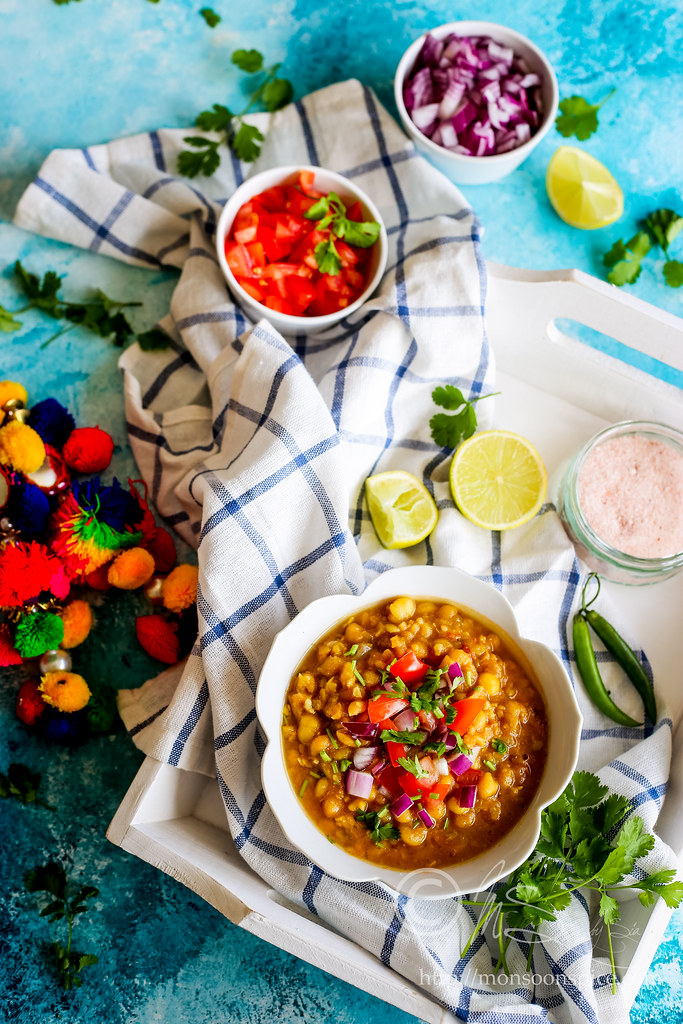
Learn how to make Bengali Ghugni Chaat ~Calcutta style vegan yellow peas curry garnished with assorted fresh toppings
My love for Indian street food has no beginning and no end… This ongoing affair with street food is unparalleled to any other food, including the comfort foods, and I can quite happily go on living just eating street food for rest of my life. As much as I love deep fried, calorie loaded foods which I like to binge on occasionally, it’s the nutritious, delicately spiced street foods bursting with big flavours I am enslaved to. Apart from being highly addictive, these Indian street foods are packed with nutrition, nourishing and guilt-free. And there are couple of street food that screams comfort food, which wraps you in a warm blanket on a cold, cold night. One such recipe is Ghugni Chaat, a delicious yellow peas snack is a popular street food of Eastern Indian states of West Bengal, and some parts of Orissa, Assam and Bihar.
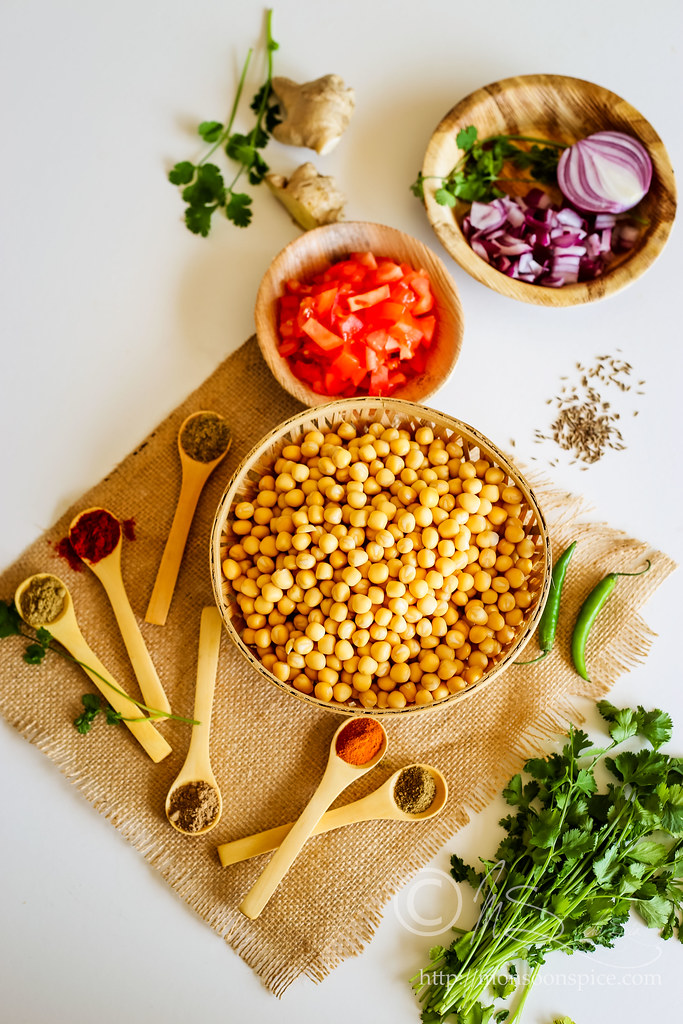
Ingredients for Calcutta Style Ghugni Chaat
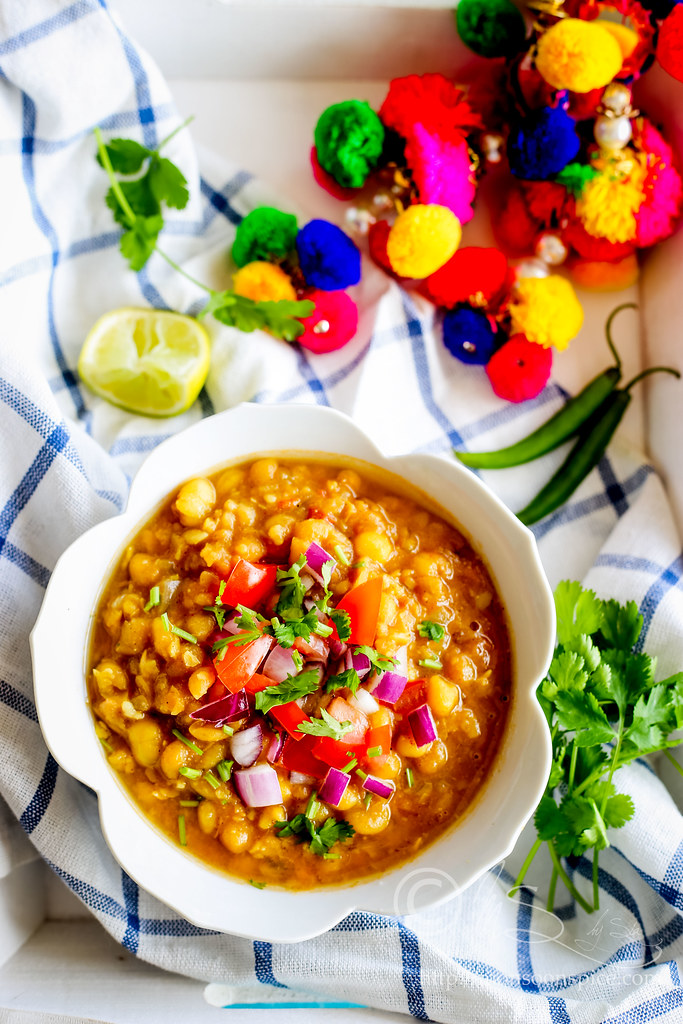
To make Ghugni Chaat, dried yellow peas are soaked overnight and pressure cooked until soft and almost mushy and then simmered in a spicy and sour gravy of finely chopped onions, tomatoes, ginger and a special spice blend called Moodi/Bhaja Masala. A traditional Ghugni is made with dried yellow peas, sold as vaTana in Indian groceries in the lentil and bean aisles. Although there are other versions of Ghugni made with black or white chickpeas or dried green or white peas, I personally prefer the dried yellow peas which easily takes in layers of flavours added to it. Some versions of Ghugni Chaat also included meat, such as lamb, and some are made without garlic and onions during the festival times.
It is quite filling meal on its own topped with julienned ginger, finely chopped green chillies, onions and tomato, but it can be served with traditional breads like luchi, poori and rotis. It is also served with Pav buns, puffed rice and at times with hot onion pakodas. I, on the other hand, served it with some simple aloo tikkis (spiced mashed potato patties) and topped it with some date and tamarind chutney and boy, it turned out to be most satisfying meal…
It is difficult to argue with the goodness of a well-seasoned bowl of creamy, mushy beans topped with an assortment of toppings of sweet, sour and spicy sauces and crunchy, fresh vegetables, custom made to suit your taste buds. There is nothing more satisfying than that bowl of food, especially at this time of the year, that is nourishing to the body and soul. And it’s even better if the recipe is fuss free, easy to make and the result is the hearty and comforting bowl of food that always leaves one satisfied to the core.
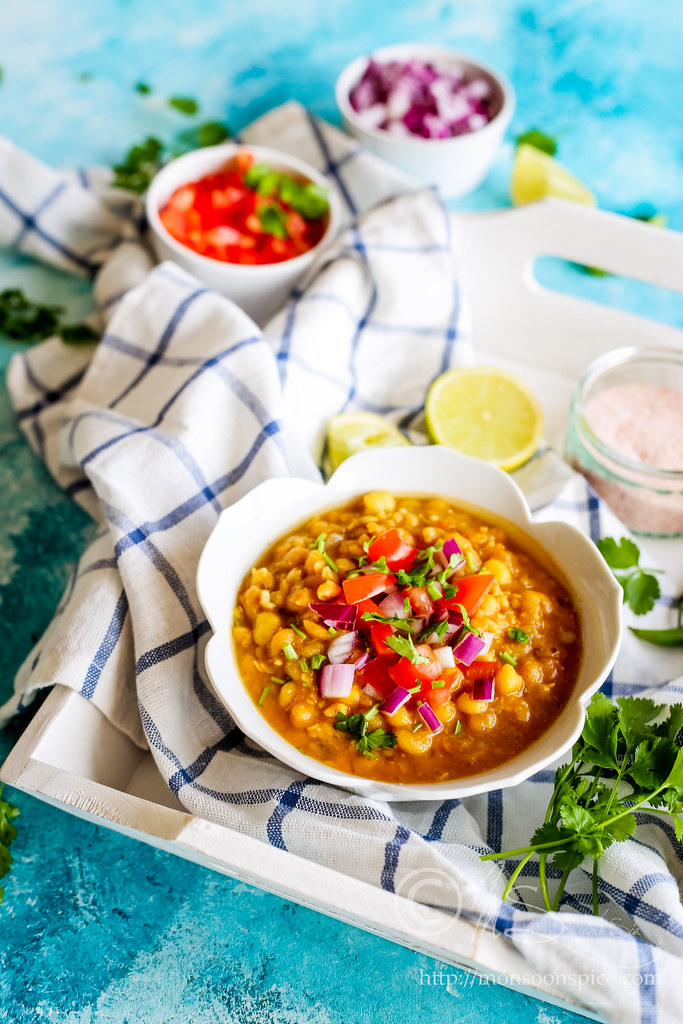
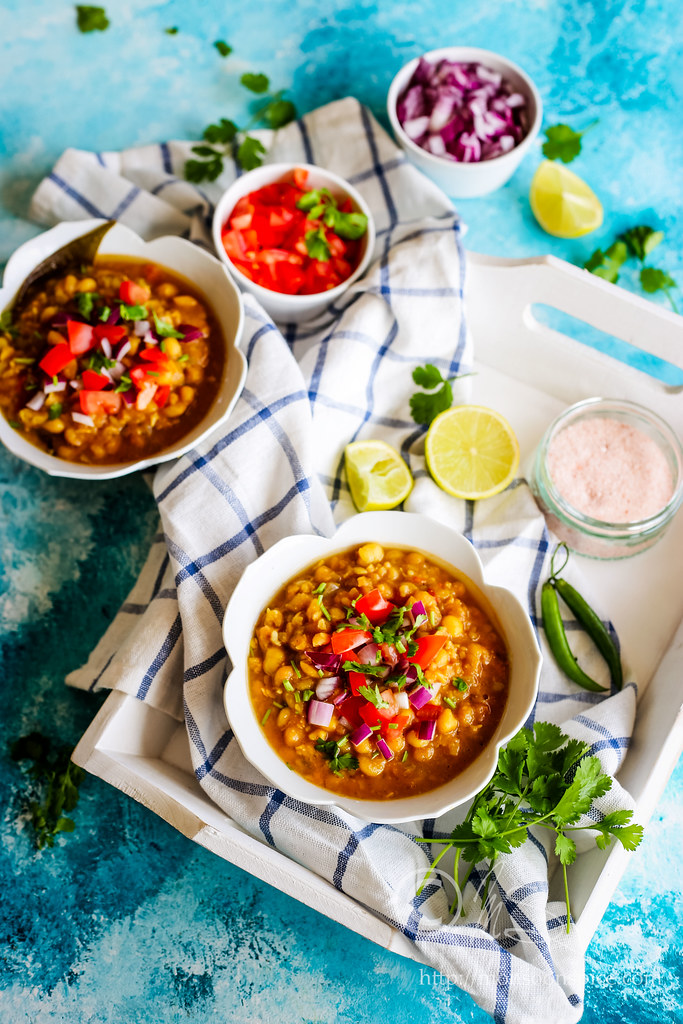
The recipe is simple and straight forward; soaked yellow peas cooked with onions, tomatoes and a special spice blend called Bhaja Masala or Moodi Masala which is a heart and soul of Ghugni. Either you can make a fresh batch of Moodi/Bhaja Masala (recipe below) or use assorted spices in its place. However, you decide to cook, the Ghugni will always be wholesome and delicious, packed with nutrients and protein. A dish that nourishes and comforts on a cold day. Served hot along with different accompaniments or enjoyed on its own, Ghugni Chaat with various cold garnishes is immensely flavourful and one that you will be forced to happily cook and eat many times...
Moodi Masala or Bhaja Masala (A special spice blend for Ghugni)
Prep Time: 2 mins
Cooking Time: 6-8 mins
Makes: About 3-3½ table spoons
Recipe Level: Easy/Beginner
Spice Level: Medium
Shelf Life: 1-2 months in an air tight jar
Ingredients:
1 small Bay Leaf
½ inch thin Cinnamon
1 Green Cardamom
2 Cloves
3-4 Dried Red Chilli (I used Kashmiri chilli. Adjust as per taste)
1½ tbsp. Dhania/Coriander Seeds
1 heaped tsp Jeera/Cumin Seeds
½ tsp Fennel Seeds
1 tsp Kala Namak/Black Salt
1 tsp Amchur/Dry Mango Powder
Method:
- Dry roast the bay leaf, cinnamon, green cardamom, cloves, coriander seeds, cumin seeds, fennel seeds and dried red chilli on a low heat for 3-4 minutes until the spices are roasted well and deepen in colour.
- Transfer them into a plate and let them cool down to room temperature before grinding them to smooth powder.
- Add the black salt and dried mango powder and mix them well. You can store the Bhaja Masala or Moodi Masala in an air tight jar for up to one month.
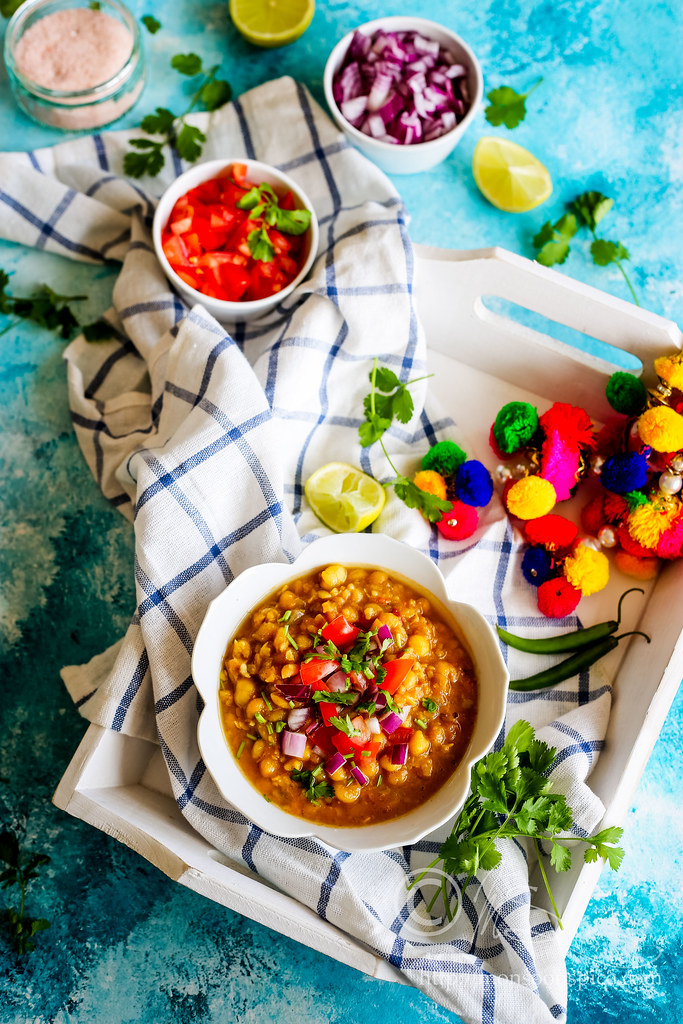

Ghugni (Dried yellow peas snack with assorted sauce/chutney and vegetables, a popular street food from Kolkatta and other Eastern Indian states)
Prep Time: 5-8 mins (6-8 hours of soaking time)
Cooking Time: 25-30 mins
Recipe Level: Easy/Beginner
Spice Level: Medium
Serves: 4-5 people
Shelf Life: Best served fresh, but can be refrigerated for 2-3 days
Serving Suggestion: Read notes
Ingredients:
1 cup Dry Yellow Peas, washed and soaked overnight
1 medium Onion, peeled and finely chopped
2-3 medium Tomatoes, finely chopped
1 inch Ginger, peeled and finely chopped
1-2 Green Chillies, finely chopped
1 tsp Sugar (Optional)
Salt to taste
Spices Used:
2-3 tbsp. Moodi or Bhaja Masala (Adjust as per taste)
-OR -
½ tsp Haldi/Turmeric Powder
1 tsp Red Chilli Powder (Adjust as per taste)
¾ tbsp. Dhania/Coriander Powder
1 tsp Jeera/Cumin Powder
½-1 tsp Garam Masala (Adjust as per taste)
1 tsp Kala Namak/Black Salt
1 tsp Amchur/Dry Mango Powder
For Tadka:
1 tsp Jeera/Cumin Seeds
¼ tsp Hing/Asafoetida (Optional)
1 tbsp Oil
For Garnishing:
1 small Red Onion, peeled and finely chopped
1 medium Tomato, finely chopped
1 tbsp Coriander Leaves, finely chopped
1-2 Green Chilli, cut into thin rounds (Optional)
1 Lime, cut into quarters
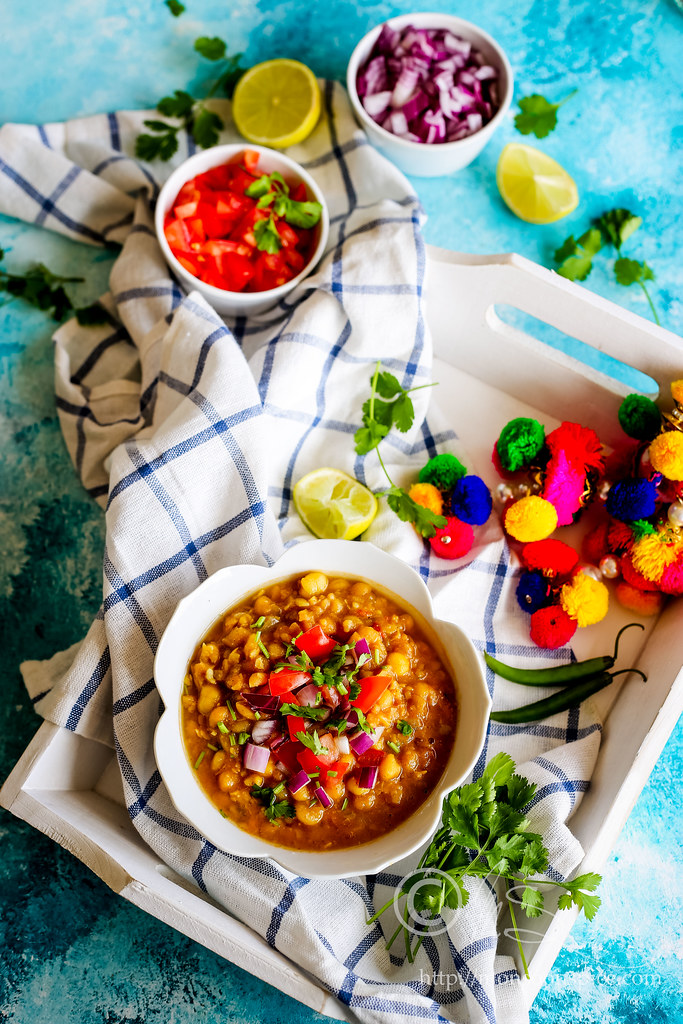
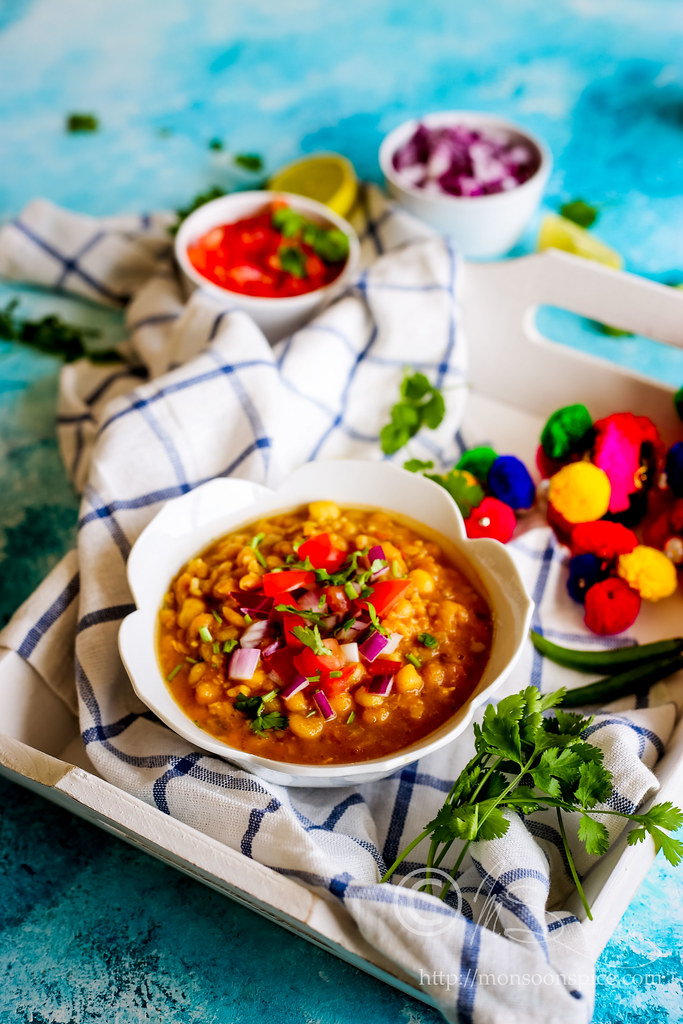
Method:
Preparation:
- Wash and soak the dried peas overnight or for 6-8 hours in enough water.
- If preparing the Bhaja or Moodi Masala from scratch, follow the recipe above. Alternatively, you can use the assorted spices mentioned above in its place.
- Chop the onion, tomatoes, ginger and green chillies and keep them aside.
Proceed to cook:
- Drain water from soaked yellow peas and place them in pressure cooker or a heavy bottomed pan. To this add turmeric powder and about 3½ - 4 cups of water. Close the lid and pressure cook for one whistle or cook on stove top for 15-18 mins on a medium flame. The peas should be soft and mushy when pressed between fingers, and yet should retain its shape.
- While the peas are cooking, heat oil on a medium flame and once hot, add cumin seeds and hing. When cumin seeds sizzles, add finely chopped onions and sauté for 2-3 minutes until the edges turn golden brown.
- Add chopped ginger, green chillies and sugar and fry them for a minute.
- Next add the Moodi/Bhaja Masala or the assorted spices mentioned above (red chilli powder, coriander powder, cumin powder) and fry them for about 30 seconds.
- Add finely chopped tomatoes and fry them on medium flame for 4-5 minutes until the tomatoes turn mushy and releases its juice.
- Mix in cooked peas and add garam masala, black salt and dry mango powder. Add salt to taste and mix them all well. Let the peas simmer for 4-5 minutes for all the flavours to blend well and until the gravy thickens.
- Turn off the flame and let the peas rest covered for 8-10 minutes for all the flavours to develop and blend harmoniously.
- Reheat the Ghugni before serving hot in a bowl garnished with finely chopped onions, tomatoes, coriander leaves and a wedge of lime to squeeze on top. You can also add some finely chopped green chillies on top if you are feeling little adventurous. Enjoy!
Sia's Notes:
- Take care not to overcook the peas until it loses its shape and becomes mushy.
- The Moodi or Bhaja Masala adds distinct flavour to the Ghugni. If you are short on time, just replace it with the assorted spices mentioned above.
- You can serve this Ghugni Chaat on its own topped with finely chopped onions, tomatoes, coriander leaves and green chillies. To make it a wholesome meal, serve it on top of aloo tikki, date and tamarind chutney, green chutney or with traditional breads like luchi, poori and rotis. It is also served with pav buns, puffed rice and at times with hot onion pakodas.

No comments:
Post a Comment
Namaste! I am Sia and welcome to Monsoon Spice, my virtual home. Thank you for all your comments, inputs and feedback. I really appreciate the valuable time you spent browsing through my recipe repertoire.
I hope you have found what you are looking for today. Feel free to leave any questions or queries you have on the recipes posted here. If you have any recipe requests, please drop a line at Ask Sia page. I will try to respond to all your queries as soon as possible to best of my knowledge.
I welcome all your valuable inputs and constructive criticism as long as it is meant to help and improve the blog. I reserve the right to delete any comments that are rude, abusive, written with the intent to advertise, contain profanity or considered spam.
I hope that you will stop by again to read my rants, learn new recipes and share your ideas. Have a good look around and enjoy your time here. Thank you once again!